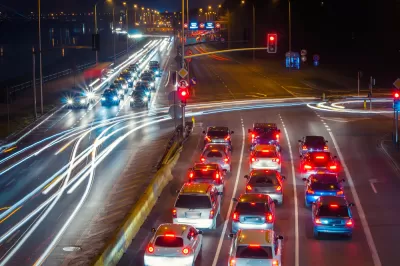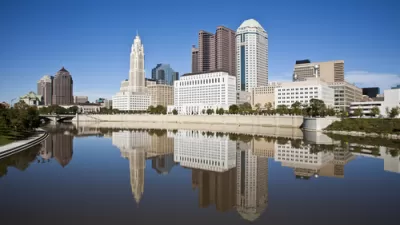The U.S Department of Transportation's Smart Cities Challenge will provide funding for seven finalists to further develop proposals to develop high-tech transportation solutions.

Alissa Walker reports on the announcement of seven finalists in the U.S. Department of Transportation's "Smart Cities Challenge." The seven finalists announced over the weekend "will receive $100,000 each and work closely with the USDOT and a group of partners to streamline their proposals," according to Walker. Eventually, one city will receive up to $40 million to fund their strategy from the U.S. DOT, and an additional $10 million from Microsoft co-founder Paul Allen's company Vulcan. Walker's article includes more background on the competition so far, as well as next steps for the finalists.
U.S. DOT Secretary Anthony Foxx announced the following competition finalists:
- Austin, Texas
- Columbus, Ohio
- Denver, Colorado
- Kansas City, Missouri
- Pittsburgh, Pennsylvania
- Portland, Oregon
- San Francisco, California
The announcement took place at the South By Southwest Interactive festival taking place in Austin. The festival and the news about the competition attracted news about the finalists from other publications. Tim Stevens reports for CNET on the finalists. Tom Knox reports for the Columbus Business Journal on the details of the proposals that got Columbus into the final group. Austin Mayor Mayor Steve Adler also sent a press release celebrating his city's inclusion among the finalists.
Just a month ago, the U.S. DOT was spreading news about the large response to the competition, after 77 cities submitted competition proposals. The large number of submissions compelled the U.S. DOT to announce seven finalists—two more than the originally intended five finalists.
FULL STORY: These 7 American Cities Will Compete for $40 Million to Create Transportation Utopias

Maui's Vacation Rental Debate Turns Ugly
Verbal attacks, misinformation campaigns and fistfights plague a high-stakes debate to convert thousands of vacation rentals into long-term housing.

Planetizen Federal Action Tracker
A weekly monitor of how Trump’s orders and actions are impacting planners and planning in America.

San Francisco Suspends Traffic Calming Amidst Record Deaths
Citing “a challenging fiscal landscape,” the city will cease the program on the heels of 42 traffic deaths, including 24 pedestrians.

Adaptive Reuse Will Create Housing in a Suburban Texas Strip Mall
A developer is reimagining a strip mall property as a mixed-use complex with housing and retail.

Study: Anti-Homelessness Laws Don’t Work
Research shows that punitive measures that criminalized unhoused people don’t help reduce homelessness.

In U.S., Urban Gondolas Face Uphill Battle
Cities in Latin America and Europe have embraced aerial transitways — AKA gondolas — as sustainable, convenient urban transport, especially in tricky geographies. American cities have yet to catch up.
Urban Design for Planners 1: Software Tools
This six-course series explores essential urban design concepts using open source software and equips planners with the tools they need to participate fully in the urban design process.
Planning for Universal Design
Learn the tools for implementing Universal Design in planning regulations.
Heyer Gruel & Associates PA
JM Goldson LLC
Custer County Colorado
City of Camden Redevelopment Agency
City of Astoria
Transportation Research & Education Center (TREC) at Portland State University
Jefferson Parish Government
Camden Redevelopment Agency
City of Claremont




























